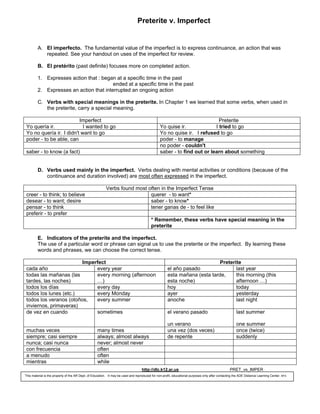
Pret vs imper
- 1. Preterite v. Imperfect A. El imperfecto. The fundamental value of the imperfect is to express continuance, an action that was repeated. See your handout on uses of the imperfect for review. B. El pretérito (past definite) focuses more on completed action. 1. Expresses action that : began at a specific time in the past ended at a specific time in the past 2. Expresses an action that interrupted an ongoing action C. Verbs with special meanings in the preterite. In Chapter 1 we learned that some verbs, when used in the preterite, carry a special meaning. Imperfect Preterite Yo quería ir. I wanted to go Yo quise ir. I tried to go Yo no quería ir. I didn't want to go Yo no quise ir. I refused to go poder - to be able, can poder - to manage no poder - couldn't saber - to know (a fact) saber - to find out or learn about something D. Verbs used mainly in the imperfect. Verbs dealing with mental activities or conditions (because of the continuance and duration involved) are most often expressed in the imperfect. Verbs found most often in the Imperfect Tense creer - to think; to believe querer - to want* desear - to want; desire saber - to know* pensar - to think tener ganas de - to feel like preferir - to prefer * Remember, these verbs have special meaning in the preterite E. Indicators of the preterite and the imperfect. The use of a particular word or phrase can signal us to use the preterite or the imperfect. By learning these words and phrases, we can choose the correct tense. Imperfect Preterite cada año every year el año pasado last year todas las mañanas (las every morning (afternoon esta mañana (esta tarde, this morning (this tardes, las noches) …) esta noche) afternoon …) todos los días every day hoy today todos los lunes (etc.) every Monday ayer yesterday todos los veranos (otoños, every summer anoche last night inviernos, primaveras) de vez en cuando sometimes el verano pasado last summer un verano one summer muchas veces many times una vez (dos veces) once (twice) siempre; casi siempre always; almost always de repente suddenly nunca; casi nunca never; almost never con frecuencia often a menudo often mientras while http://dlc.k12.ar.us PRET_vs_IMPER This material is the property of the AR Dept. of Education. It may be used and reproduced for non-profit, educational purposes only after contacting the ADE Distance Learning Center. RFS